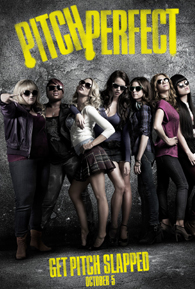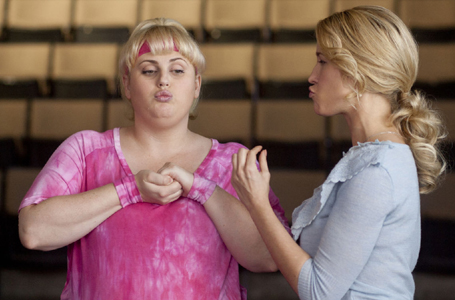
For the film, Anna Kendrick plays Beca, a freshman in college and an aspiring deejay whose skills at remixing and musical bricolage may come in handy in rejuvenating the Bellas, all-girls a cappella group on campus that's a bit of a joke thanks to their boring, safe selection of songs and choreography they use year after year. She's so talented that there's a chance for the Bellas to ride all the way to the state intercollegiate finals. That is, if the group pulls together despite being a bunch of misfits and un-PC stereotypes (the fat one, the black lesbian, the inaudible Asian, etc.) held under the thumb of a near-dictatorial senior.
So while the dramatic element of Pitch Perfect centres on the school year and the socialisation of freshmen into the wider community of students and campus life and the friendships that are built, much of the comedy, like in Glee, centres on just how far the politically incorrect stereotypes can be pushed without becoming actually offensive. At times, these jokes may feel a little too forced but thankfully the film's strong point is the fun musical arrangements which tune to the sensibilities of mashup and remix culture. These exercises in extemporaneous musical composition and performance come across as spirited, humorous and clever — almost like the proceedings of Bach family reunions centuries ago, where his biographer writes:
"As soon as they were assembled a chorale was first struck up. From this devout beginning they proceeded to jokes which were frequently in strong contrast. That is, they then sang popular songs partly of comic and also partly of indecent content, all mixed together on the spur of the moment... This kind of improvised harmonizing they called a Quodlibet, and not only could laugh over it quite whole-heartedly themselves, but also aroused just as hearty and irresistible laughter in all who heard them."












 打印版本
打印版本


















读者回应
抢先发表第一个回应吧!
请先登入再使用此功能。